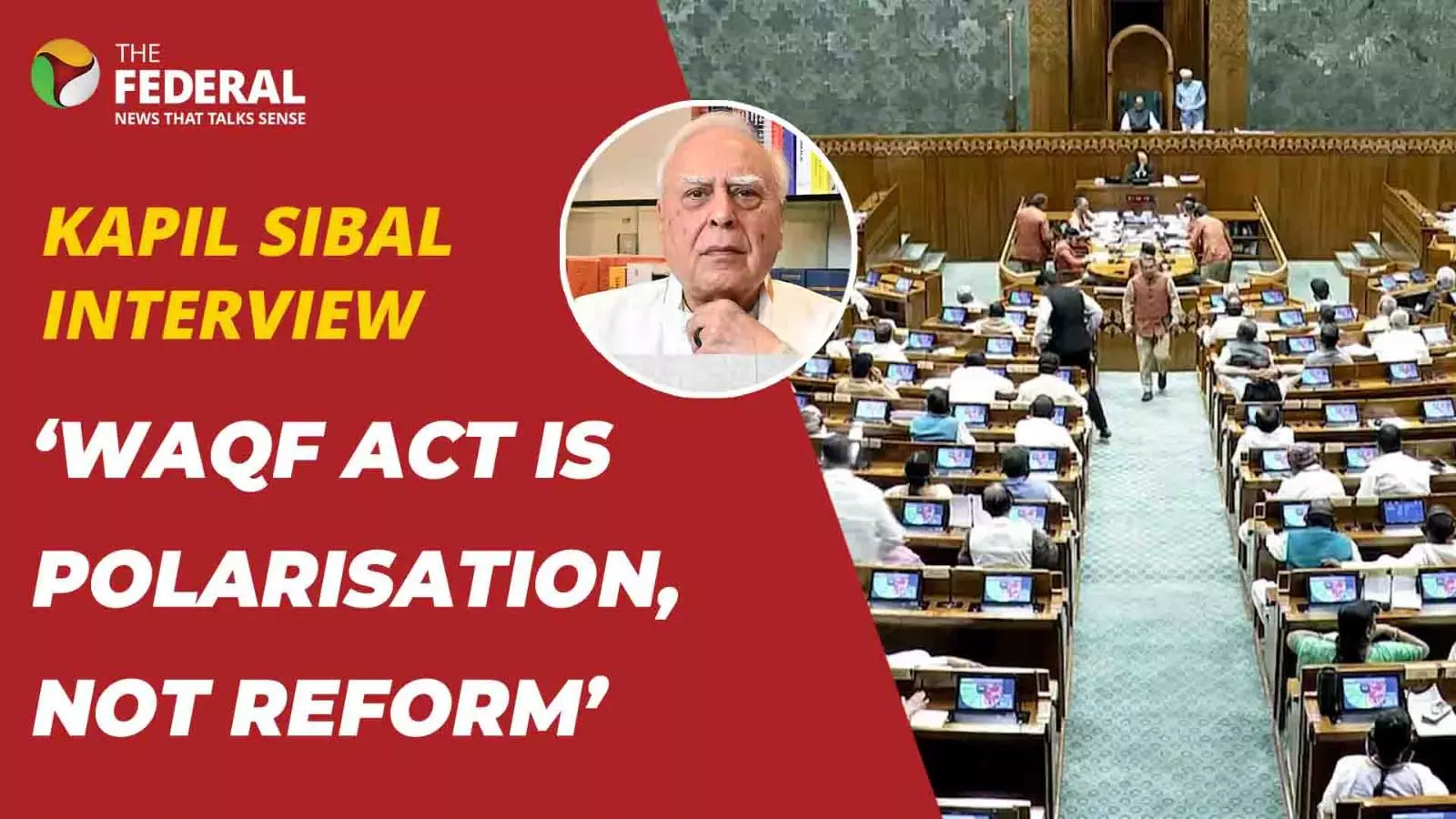
Exclusive: Kapil Sibal calls Waqf law 'unconstitutional', alleges political agenda
In an exclusive interview with The Federal, the Rajya Sabha MP questions whether the law is true reform or just another tool for political control

Senior advocate and Rajya Sabha MP Kapil Sibal has challenged the recently passed Waqf (Amendment) Bill in court, labelling it "entirely unconstitutional". In a candid interview with Sanket Upadhyay on The Federal, Sibal asserted that the bill violates fundamental rights of the Muslim community under Article 25 and 26 of the Constitution.
He argued that while secular aspects of religious institutions may be regulated, the law oversteps into religious freedoms and administration, stripping the Muslim community of its autonomy over Waqf properties.
Also read: Waqf Act row: 3 dead in Murshidabad violence; HC orders deployment of central forces
“The right to worship where, how, and when is protected by the Constitution,” he emphasised, asserting that the government cannot take control of these rights through such legislation.
Autonomy under threat
Sibal highlighted that the amendment allows the government to dominate Waqf Boards by appointing non-Muslim members, disrupting the community-led structure. “In Hindu endowments, all nominees are Hindus. The same applies to other denominations. So why this change only for Muslims?” he questioned.
He pointed out that this violates the principle of equal treatment under the law, warning that the Act sets a dangerous precedent of state interference in religious affairs.
Additionally, the Act abolishes the concept of “Waqf by user,” a religious practice recognised even in the Ram Janmabhoomi judgement (para 1134). Sibal noted that such a move is not only unconstitutional but also undermines judicially acknowledged religious customs.
Government as the judge
A core contention raised by Sibal is the conflict of interest embedded in the Act's dispute resolution mechanism. If a conflict arises between the Waqf Board and the government over land, the matter is left to be decided by a government-appointed officer.
“How can the government be a judge in its own case?” he asked, adding that once the government declares a land does not belong to Waqf, the board must cease its functions—without appeal.
Though legal recourse is theoretically available, Sibal warned that jurisdictional hurdles and years of litigation make it nearly impossible for the Waqf Board to seek justice. “By the time the dispute is resolved, many of us may not even be alive,” he remarked cynically.
Part of a political agenda
Sibal dismissed the government’s justification for the Act—that Waqf properties are being used to usurp public land—as unfounded. “How do they know a document written 400 years ago was deliberately written to claim land?” he asked, calling such assumptions “absurd.”
He argued that the Waqf law is not about reform but is part of a wider political strategy targeting minorities. “Whether it’s 'love jihad', UCC, or the Places of Worship Act, this is about polarisation, not governance,” he said.
Citing examples like restrictions on meat sales, madarsa registration, and withdrawal of scholarships for Muslim students, Sibal described these developments as part of dominance-based politics since 2014.
Unequal reform and toxic ideas
Sibal clarified that he is not against reform, but called for uniform reforms across religious institutions. “If you say ‘One Nation, One Law’, apply it across the board. Why should there be non-Muslim appointees in Waqf Boards, but none in Hindu endowments?” he asked.
He acknowledged that misuse by some Waqf functionaries (mutawallis) does happen, but reiterated that reform should be done in good faith—not to target a community.
“This idea of reform is toxic, designed to pollute public discourse and exploit religious divides for electoral gain,” he concluded.
Hopes pinned on judiciary
Asked if he expects a favourable ruling from the Supreme Court, Sibal said, “We live on hope.” He believes the court will be able to manage the multiple petitions filed and deliver a verdict based on constitutional values.
Also read: SC to hear petitions challenging Waqf Amendment Act on April 16
Sibal also lamented that many institutions, including media and legal professions, have failed to uphold constitutional values. “We are obsessed with making money. But our duty is to stand by the Constitution,” he said.
He ended by reaffirming that this would not be the last attack on minorities. “There will be more. This is their political model,” he warned, urging the public to remain vigilant.
The content above has been generated using a fine-tuned AI model. To ensure accuracy, quality, and editorial integrity, we employ a Human-In-The-Loop (HITL) process. While AI assists in creating the initial draft, our experienced editorial team carefully reviews, edits, and refines the content before publication. At The Federal, we combine the efficiency of AI with the expertise of human editors to deliver reliable and insightful journalism.

